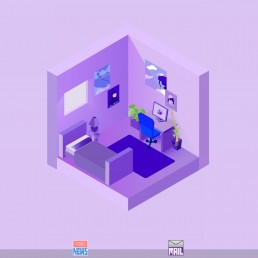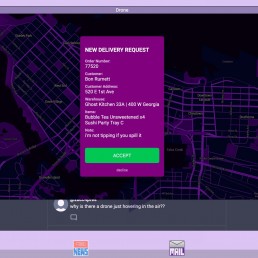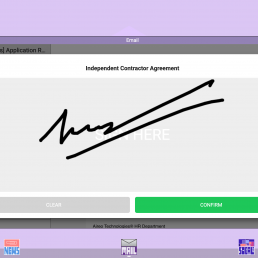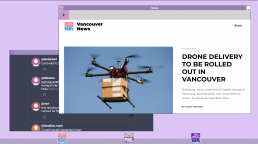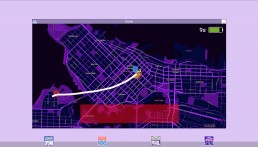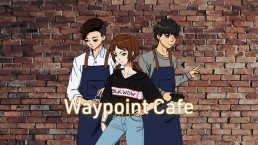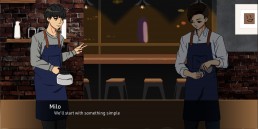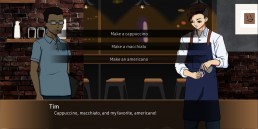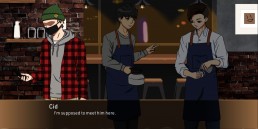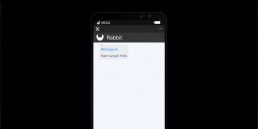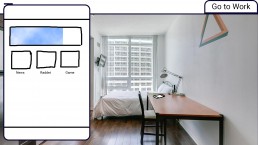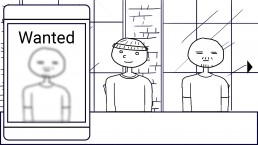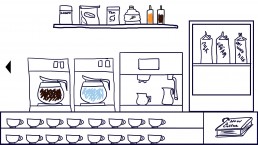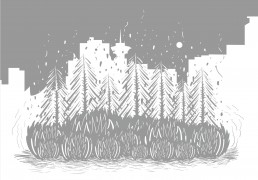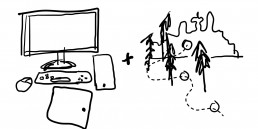Independent Contractor | June & Declan
> It’s the year 2032 and you’re working a grueling gig-based job for a tech company...
Your task: remotely dispatch drones to deliver packages to people’s homes from your computer. As you work, ulterior motives at play deep within the company become increasingly apparent. You soon come face to face with moral dilemmas as the story unfolds, with your actions revealing an impact on the world.
Independent Contractor is a web-based simulation game in active development.
A Critique on Surveillance Capitalism & Gig Economy
As a critical game, Independent Contractor simulates the desktop of a gig economy worker, with multiple applications. Exploring surveillance capitalism’s complex structures in our digital existence, and the problematic labour issues in the gig economy industry, Independent Contractor invites the player to reflect on these issues.

Developed with Webflow & VueJS
To prototype the in-game applications we used Webflow which is a visual-coding website tool geared towards designers. It has a great web-design editor allowing us to customize the CSS and page layouts more easily to later be exported. After creating Webflow prototypes we began developing the core functionality and interactions of the game itself.
This is where our tasks started splitting off. June took on Webflow and certain visual designs while Declan coded using JavaScript and worked on tying together the various pieces, pages, and interactivity for the game. After designing the UI prototypes on Webflow, we exported design components and pages to help us begin creating the actual website and functionality for the game.
We learned a thing, or two...
Working on Independent Contractor has been such a great learning experience. Overall, the development process was a lot of learning, troubleshooting, and devising innovative ways of working on both an individual and collaborative scale. There are endless possibilities for designing on the web today which was at first overwhelming but we were able to constrain ourselves to the desktop medium we constructed. Our process and journey throughout creating this game taught us to be flexible and constantly search for new and effective ways to do things.
Moving forward, we would like to refine the puzzles, adding more delivery challenges and puzzles for people to play. We plan to continue developing the narrative, building a more complex world with many more events that will take place. The game also offers a space for writing and social critiques that can be further explored.
We hope to bring a new way of learning about surveillance capitalism and the gig economy that inspires hope and change in our interactions with technology. We also hope you laugh at the jokes we make inside the game. Thanks for reading!

June Tang
Moving from Ho Chi Minh City to Vancouver for my Bachelor’s Degree in Interaction Design, I am interested in combining interaction design skills with my cultural background to create delightful experience. I am currently exploring how interaction design can impact textual works through format innovation.
When I am not designing, I can be found illustrating, writing sad fiction, or making an oat milk latte, or playing games, or making music, or…
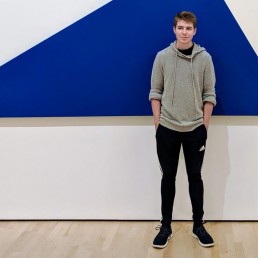
Declan Reilly-Gordon
Declan is an interaction designer and web developer who loves to explore creative and impactful ways of utilizing emerging technology.
Waypoint Cafe
Description
Waypoint Cafe is a single player story-based game geared towards casual gamers who enjoy shorter narrative experiences. The game is set in a fictional city where aspects of daily life, such as work and social interactions have been gamified. Putting players in this strangely familiar environment, Waypoint Cafe draws parallels with our own data-obsessed culture, exploring privacy and media influence through a critical lens.
You can find the download to Waypoint Cafe HERE
Goal
The purpose of this project is to explore the consequences of attempting to gamify social behavior. The most prominent example of this in our world is the Chinese social credit system, but many other nations and corporate entities are responsible for this as well. The points rewards card you hold for your local grocery store, the raffle ticket stuck to the side of your morning coffee, even credit scores are used to change the way you behave and encourage acting in line with the goals of those who implemented these systems.
Process
Much of the project was researching and sketching game mechanics that would fit the theme of social credit. The challenge was finding the right balance of simplicity and engagement. After all, if the game is too easy, it becomes boring, and if it’s too hard, people give up.
The main mechanic I ended up tweaking and tuning was having the player actually living in a fictional world where hyper-tuned social credit systems were deeply ingrained in daily life. players would focus on maintaining their score while working at a mundane day job. The challenge is maintaining a good score while being presented with moral dilemmas and financial challenge while also remembering how to make that caramel macchiato the customer ordered.
Reflection
The main challenge I faced throughout this project was time. As I chose to be a solo act for this project, I was responsible for creating the entire project from concept to art to development. This also included processes that I was inexperienced in, leading to a lot of my time being spent learning as well. In the end the demon we all fear cut my project short and I was not able to complete the game I had envisioned before the end of the school year. However, I was able to create something playable. It’s not much but it’s something I’m proud of and I personally had a blast making, and I hope you get to enjoy it too.
Again you can find the download to Waypoint Cafe HERE

About Ryan Chen
I’m a firm believer in fun things. Growing up, it was always my dream to work on the very video games that I was playing. In my free time you can find me drawing pictures, tinkering with electronics, messing with code or playing games.
I just graduated from Emily Carr University of Art + Design with a bachelors in Interaction Design. I’m currently polishing up my UI design skill and learning motion graphics in hopes of finding work in the games industry.
Check out my portfolio: chenryan.ca
Compassion for a Lonely City
What if gameplay can become a tool in discovering the importance of human interconnection within a lonely city?
Solution
The “Compassion for a Lonely City” research project centers around a theme of isolation and disconnection in the city of Vancouver. Through collaborative gameplay, this project aims to bring awareness, inspiration and create critical conversation around Vancouver’s loneliness cultures and it’s lack of interconnectivity.
This project encompasses two conceptualizations of the gaming experience called “Into the Void”. The first, an online game with an “In-Real-World” aspect and the second being an Interactive installation, an alternative 2-4 player arcade table, intended for a public/gallery space. As both of these conceptualizations are simply containers to the gaming experience, and due to the unprecedented nature of COVID-19, the project focused on creating a prototype of “Into the Void” that would have been used within the interactive installation.
Opportunity
While “Compassion for a Lonely City” may not “solve” loneliness, using gameplay as a medium to address loneliness in Vancouver can act as a point of entry by reaching the affected demographic through online communities. It also has the ability to transition a screen dominant experience into our physical reality, which can help mediate a balance between our online communities and physical communities. Additionally, I want to challenge the irony of making a video game for this project since they can be naturally isolating experiences. Overall, we need to re-evaluate our relationship with strangers in order to cultivate new meaning in what community and compassion for others are to us. To do that, we need more intriguing opportunities in creating human interconnections in alternative and evocative ways.
Process
In the process of realizing “Compassion for a lonely City” I used UX design methods, such as exploration and observation to conversation and user testing, in combination with my artistic practice. This was at times challenging but ultimately rewarding and lead to unexpected outcomes. Scratch was used to develop the video game protoypes and a Makey Makey controller for the experience of the arcade. More about my research and process can be found in my medium article:
Reflection
I would like to see the online to in-real world game fully realized. Within that, there is also a potential space that the two parts can be combined into one cohesive experience. Although my technical abilities are not currently adequate at this stage the experience could use augmented reality to weave its story between the physical and real world. This approach would develop the game towards a larger city-scale and act as a collection tool for player data around isolation and loneliness to reflect back meaningful information to the user as well as an aggregated emotional sentiment on a larger scale.

About Julia Nowakowski
As an interaction designer, I value the ability to work in an interdisciplinary nature that is required to build complex concepts. Within that, I aim to continually learn and build my skill set since design as a whole is always changing and there is no reason to stop and say that I know enough.
Contact me at julia.nowakowski9@gmail.com or Link up on Linkedin

